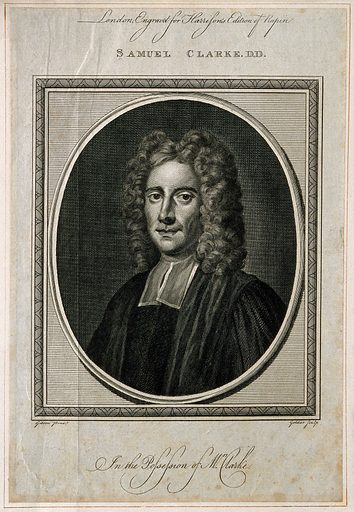6.2.2 Cosmological Arguments for the Existence of God
LEARNING OBJECTIVES
By the end of this section you will discover:
- What is meant by a “cosmological” argument for the existence of God.
- The argument from contingency.
- The argument from causality.
- Strengths and weaknesses of cosmological arguments.
The word “cosmos” is Greek for “world,” so cosmological arguments suggest God as the only adequate hypothesis in explaining why there is something rather than nothing. Cosmological arguments go back at least as far as Plato (428-348 BCE), with influential formulations being offered by Thomas Aquinas (1225-1274) and Gottfried Leibniz (1646-1716).
Aquinas & the Cosmological Arguments: Crash Course Philosophy #10

One influential formulation comes from Samuel Clarke (1675-1729). In A Demonstration of the Being and Attributes of God, Clarke argues for the conclusion that God is the reason for the universe’s existence by showing the bankruptcy of the alternatives. Something must have existed from eternity, Clarke reasons, since to suppose otherwise would be to suppose that something arose from nothing, which is absurd. Further, this eternal something must be independent of the universe. Think of a sapling tree. Like every individual thing in the universe, its existence is contingent—it could fail to exist—as demonstrated by the fact that it once did not exist and by the fact that it is susceptible to change and destruction.
Therefore, its reason for existing must be sought outside it; if we seek the reason why the sapling exists, we must refer to its parent tree, the soil, the sun, and the air. But if everything in the universe is contingent, then so is the universe itself, and its reason for existing must be sought outside it. Even if the universe had no beginning in time, and we could trace the sapling’s reason for existing backward indefinitely, we would still need to explain why there was this endless succession of contingent beings rather than nothing.
Think of “reason for existing” as being like the parcel in the children’s game “pass the parcel.” Even supposing an infinite number of players, or a circle of players passing the parcel for an eternity, if every player must receive the parcel from another (like a contingent being receives its reason for existing from another), then we would still face the question where the players got the parcel in the first place. Lastly, the being outside the universe must have a necessary existence; that is, it must contain the reason for its existence within itself, such that it could not fail to exist. By the difficulties attending all the alternatives, we are driven to accept that not all beings are contingent; our search for reasons for existing must reach its terminus in a necessary being, God. Clarke admits that the notion of necessary existence is difficult to conceive, since all the beings we encounter are contingent, but holds that it is the only adequate hypothesis in explaining why there is something (Clarke 1705).
Clarke’s cosmological argument was also criticized by Hume in his Dialogues Concerning Natural Religion. Hume questions why the universe itself may not be the necessary being. Clarke’s reason for rejecting this idea was that everything in the universe is contingent. But, Hume notes, Clarke is committing the fallacy of composition. A flock may be composed of sheep destined for slaughter, but this does not prove that the flock itself is destined for slaughter. Likewise, perhaps the universe’s existence is necessary despite the contingency of every individual thing in it, a thought which is lent some credibility by the physical principle that matter can neither be created nor destroyed. Raising further havoc, Hume questions whether there can even be such a thing as a necessary being. It seems to be a feature of claims which are necessary—like “2+2=4” or “a nephrologist is a physician of the kidneys”—that their contraries cannot be conceived without contradiction, as with “2+2=5.” But we seem able to conceive any being’s nonexistence without contradiction; just as I can coherently conceive of the sapling’s nonexistence, I can coherently conceive of God’s nonexistence (as shown by the fact that we feel the need to debate God’s existence).
Another issue is that Clarke’s cosmological argument, like many other formulations, invokes the “principle of sufficient reason,” or the idea that every state of affairs has a reason why it is so and not otherwise. This seems to be a principle that we make thorough use of from early childhood in endlessly asking “why?” and expecting that there must be answers. Because of this principle, we insist that the universe must have a reason for its existence, rather than allowing that the universe is an unaccountable “brute fact.” But why should we accept the principle of sufficient reason? It does not seem to be a necessary truth or something we can infer from experience….

A quite different version of the cosmological argument is presented by William Lane Craig, drawing upon the Islamic philosophers of the 9th-12th centuries such as al-Ghazali (1058-1111), called the kalām cosmological argument, also known as the argument from causality.
Craig argues that whatever begins to exist has a cause, that the universe began to exist, and that God must be invoked as its cause. Why believe that the universe began to exist? For one thing, it seems that the universe cannot have an infinite temporal duration since the successive addition of finites cannot add up to something infinite. Just as one cannot “count to infinity,” the compounding of the moments that pass in time could not ever add up to an infinite temporal duration. For another, if we make the supposition that the universe has an infinite temporal duration various absurdities arise. Sundays are a subset (one-seventh) of all the days that have ever occurred. A very bored deity would count out six non-Sundays for every Sunday. But if the universe has an infinite temporal duration, then an infinite number of Sundays have occurred. And an infinite number of non-Sundays have occurred. Therefore, the subset is equal in magnitude to the set—an absurdity. So, the universe began to exist.
Notice that Craig’s argument avoids referring to necessary beings or the principle of sufficient reason; Craig’s argument requires only that if something begins to exist, then it has a cause. Supporters of the kalām cosmological argument may also cite scientific evidence to support the idea that the universe began to exist, for instance, the Big Bang theory or the idea that if the universe had an infinite temporal duration, then entropy would guarantee that complex matter would not exist presently (Craig 1979).
One key question about Craig’s kalām cosmological argument is whether the cause of the universe must be something like our conception of God, a kind of personal agent. Craig … suggests that the cause of the universe must be timeless, outside of time entirely. Physical causes bring about their effects, as it were, immediately. For example, an effect like the process of water freezing will begin to happen as soon as its cause, a sub-zero temperature, is present. So, if the cause of the universe is timeless and is a physical cause, we would expect the universe to have always existed. But as we have seen, that cannot be. So, the cause of the universe must be non-physical. Aside from physical causes, we sometimes explain effects as resulting from actions—we have the idea that personal agents bring about effects spontaneously as and when they will to do so, in a way that is different than and not entirely determined by physical causes. On this model, plausibly the cause of the universe is the action of a personal, but non-physical, agent. Others have objected, though, that it is difficult to make sense of the idea of a personal agent who acts but is also outside of time, and again that we are having to rely too heavily on our limited repertoire of concepts: for all we know, there might be causes that are neither like the physical nor like personal agency (Ibid., Hunt, Marcus William, in Branson, Introduction to Philosophy, Philosophy of Religion, Chapter 2: Reasons to Believe–Theoretical Arguments).
Strengths and Weaknesses of the Cosmological Argument
On the one hand, these arguments appeal to science. Science supports the idea of causality, that all things must have a cause and that something cannot come from nothing. Something, it seems, had to have set this chain of causality in motion. Moreover, if motion is fundamental to all things in the universe, whatever set that motion going must itself be unmoved and outside of the physical universe.
Ockham’s razor, the principle that” Entities should not be multiplied beyond necessity,” suggests that if we already have a simple and perfectly adequate explanation for the cause of the universe–God–it’s illogical to reject this because that would require the creation of a more complicated cause of the universe which is unnecessary.
On the other hand, as Hume reminds us, even if there is an uncaused cause before the beginning of the universe, there is nothing to suggest that it is the God of classical theism who is the un-caused. So, even if the Cosmological argument is proven it cannot be proven that God is responsible.
Moreover, as Hume again reminds us, we can’t assume everything in the universe has to have a cause until we have experienced everything. It is a fallacy of composition to infer from our limited observations of causality to causality as a universal principle.
Finally, why is it necessary that there be a beginning to the universe? Is it not just as plausible to assume that the universe is a perpetual motion machine that has always existed?
Works Cited
CrashCourse. Aquinas & the Cosmological Arguments: Crash Course Philosophy #10. YouTube, YouTube, 11 Apr. 2016, https://www.youtube.com/watch?v=TgisehuGOyY&list=PLUHoo4L8qXthO958RfdrAL8XAHvk5xuu9&index=11&t=466s. Accessed 12 Apr. 2022.
Gibson, Thomas. “Samuel Clarke.” Look and Learn History Picture Archive, Welcome Collection, https://www.lookandlearn.com/history-images/YW001145V/Samuel-Clarke. Accessed 12 Apr. 2022.
ReasonableFaith.org. “William Lane Craig.” Wikimedia Commons, Wikimedia Commons, 13 Mar. 2014, https://commons.wikimedia.org/wiki/File:William_Lane_Craig.jpg. Accessed 12 Apr. 2022.

